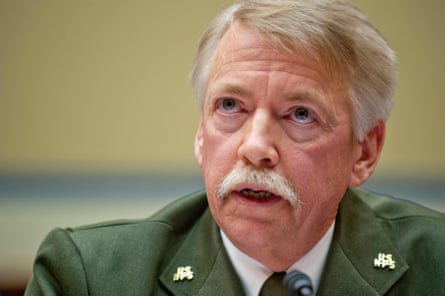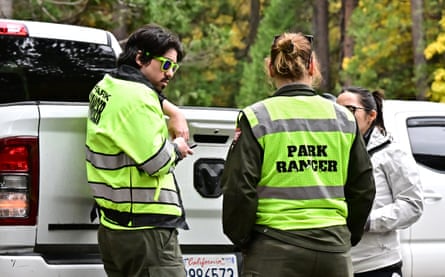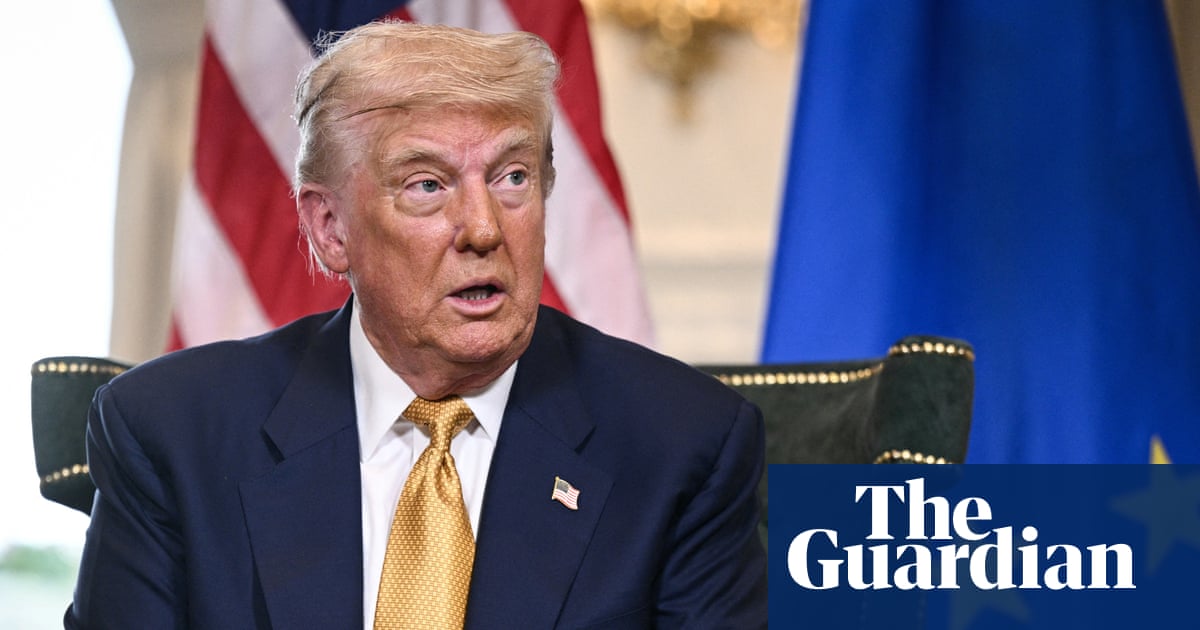Americans should “raise hell” to protect US national parks through the “nightmare” of Donald Trump’s presidency, according to a former National Park Service director, amid alarm over the impact of the federal government shutdown.
Jonathan Jarvis claimed the agency is now in the hands of a “bunch of ideologues” who would have no issue watching it “go down in flames” – and see parks from Yellowstone to Yosemite as potential “cash cows”, ripe for privatization.
Jarvis, who led the NPS from 2009 to 2017, faced intense scrutiny, a five-hour grilling in Congress and calls for his resignation after closing all 401 national park sites during a previous shutdown, in October 2013.

He was certain, despite the backlash, that it was the right thing to do: keeping them open with a skeleton staff would have put parks and their visitors at risk, his team concluded.
Over the past month, hundreds of NPS veterans including Jarvis, 72, have watched aghast as most of the agency’s workers were furloughed during the longest shutdown in US history – while the Trump administration kept all national parks open.
There have been consequences.
A fire at Joshua Tree national park burnt through some 72 acres. Yosemite faced a wave of illegal Base jumping. Yellowstone grappled with bear jams.
Vandalism included graffiti in Arches national park. A stone wall at Gettysburg national military park was damaged. Trash started to gather at various sites.

Thousands of NPS workers are typically around to guide visitors safely through parks, point them in the right direction, swiftly rescue them from danger, keep traffic moving, monitor wildlife and protect the landscape.
“You take all of that away – all of those employees – you basically are, on one hand, creating unsafe conditions for the visitor,” Jarvis said, adding: “And you’re putting basically these irreplaceable resources at risk.”
Doug Burgum, the interior secretary, was warned by more than 40 former national park superintendents in September that parks were “in jeopardy” while open during a shutdown. More than 450 former national park officials followed up last month, urging Burgum again to close the parks. Both letters went unanswered.
Contacted for comment, the Department of the Interior – which oversees the NPS – said Trump had “worked tirelessly” to minimize the impact of the shutdown. “It’s easy to criticize from the sidelines, but the reality is that the administration prioritized stability, safety, and service to the American people,” a spokesperson said.
“During this shutdown, the administration made deliberate, lawful decisions to protect essential operations that sustain America’s energy security, economic stability, and public safety,” the spokesperson said. “Activities that continued were those necessary to preserve critical infrastructure, safeguard natural resources, and prevent disruption to key supply chains that millions of Americans rely on.”

‘They’re not doing anything’
Now the shutdown is over, after 42 days, Jarvis said service staff will “bust their butts” to clean up US national parks. But he remains concerned about the lasting impacts.
Take trash. In mountain parks, from Rocky Mountain to Mount Rainier, black and grizzly bears are currently fattening up to go into hibernation: a particularly important time to ensure they don’t access garbage, and become attracted to human food.
“They will feed on it, and become habituated, and the end result of a habituated bear is either somebody gets hurt, or the bear gets killed,” said Jarvis. “By not picking up trash in the parks, letting it accumulate, fall out of the cans ... you’re setting up for an impact down the road.
“And these are things that the administration could care less about, frankly, because obviously they’re not doing anything about it.”
The NPS was founded in 1916 to both promote the use of national parks and monuments and conserve them for the enjoyment of future generations. Under Trump, its workforce has reportedly shrunk by as much as 24% amid hundreds of layoffs. Thousands more staff have resigned or retired, either out of choice or due to pressure.
The agency remains without a permanent director, and did not have one for the duration of Trump’s first term.

“I don’t get it,” said Jarvis. “I don’t get why you would mess up something that is highly popular with the American people, unless you’ve got just sort of an axe to grind.”
Inside the Department of the Interior, he divides officials appointed by Trump into two camps. Some are trying to set the NPS “up to fail” as a pretext for privatizing some of the nation’s most popular parks, he claimed, while others are focused on “facade management”: preserving the jobs of staff in visible roles, like rangers, while cutting “everything else behind the scenes”, from scientists and paleontologists to historians and landscape architects.
But backroom staff are critical at the NPS, according to Jarvis. These are the people who craft the trails, design the maps and guides, treat the water, restore the meadows, tackle the non-native plants and monitor for disease among the wildlife. “All of that activity that goes on behind the scenes is what raises the quality of the experience, and the quality of the stewardship of the resource.”
Conservationists fear that selling off national parks, or allowing companies to take control of key elements, would undermine decades of work to protect them. “The private sector can do entertainment very well,” said Jarvis. “But the profit motive is not there for conservation.”
“I’ve been to Disneyland. I’ve been to Disney World,” he continued. “They love ripping off the park service. They’ll have a fake geyser. They’ll have all kinds of entertaining kinds of things. But it’s not real.
“And I think the value proposition here for the parks is that this is real. Those are real wildlife. That’s a real bison. And it’s not behind a fence. I think the private sector would muck it up.”
Despite concerns over the fate of the NPS under Trump, Jarvis is confident that broad, bipartisan support will shield the agency from the most extreme plans for its future.
“I don’t think Congress will let the administration get away with completely dismantling the park service,” he said. “But I do think the Trump administration will continue to try.”
‘Raise hell’
Americans can help protect national parks and the service that has overseen them for more than a century, Jarvis said, by calling up their representatives in Congress, and by donating to advocacy or philanthropic support groups.

“They can volunteer,” he suggested, and help clean up parks after the shutdown. “There’s going to be a big mess,” said Jarvis. Several hundred thousand volunteers show up at national parks each year.
“And then,” he added, “raise hell! Stand out there with everybody else, and their signs. Just because we’re going back to work here, with the shutdown [over], doesn’t mean this nightmare is over. They still have big designs on hurting this stewardship institution.”

 German (DE)
German (DE)  English (US)
English (US)  Spanish (ES)
Spanish (ES)  French (FR)
French (FR)  Hindi (IN)
Hindi (IN)  Italian (IT)
Italian (IT)  Russian (RU)
Russian (RU)  3 weeks ago
3 weeks ago
























Comments